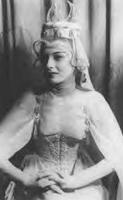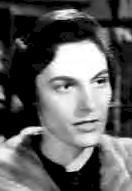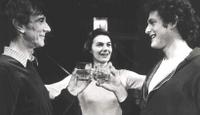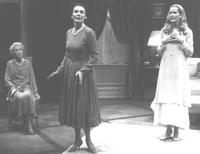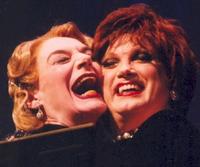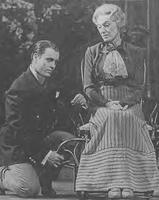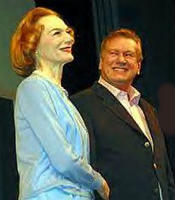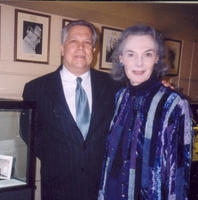[Advertisement]
[Advertisement]

TICKET / INFO
- StudentRush
- New York Show Tickets
- Givenik.com
- Telecharge.com
- Ticketmaster.com
- Group Sales Box Office
- Frugal TheaterGoer
- Broadway for Broke People
- Playbill's Rush/Lottery/SR
- Seating Charts
COMMUNITY
NEWS
- Back Stage
- Bloomberg
- Broadway.com
- BroadwayWorld
- Entertainment Weekly
- NYTheatre.com
- New York Magazine
- The New York Daily News
- The New York Post
- The New York Times
- The New Yorker
- Newsday
- NiteLife Exchange
- Playbill
- Show Business Weekly
- The Star-Ledger
- Talkin'Broadway
- TheaterMania.com
- Time Out New York
- American Theatre Magazine
- Theatre Development Fund (TDF)
- Best of Off-Broadway
- The Village Voice
- Variety
- The Wall Street Journal
- Journal News
REVIEWS
- The New York Times
- Variety
- New York Post
- NY1
- Aisle Say
- CurtainUp
- DC Theatre Scene
- Show Showdown
- Stage and Cinema
- StageGrade
- Talk Entertainment
- TotalTheater.com
- Off-Off Broadway Review
- TheaterOnline.com
- TheaterScene.net
- TheaterNewsOnline.com
WEST END
- The Stage
- 1st 4 London Theatre Tickets
- Book Your Theatre Tickets
- Compare Theatre Tickets.co.uk
- Theatre.com
- Whatsonstage.com [UK]
- ATW - London
- Musical Stages [UK]
- Albemarle of London
- Londontheatre.co.uk
- Google News
- Show Pairs
- ILoveTheatre.com
- The Official London Theatre Guide
- UK Tickets
BOSTON
CHICAGO
LA/SF
COLUMNS
- Peter Bart
- Andrew Cohen
- Ken Davenport
- Tim Dunleavy
- Peter Filichia
- Andrew Gans
- Ernio Hernandez
- Harry Haun
- Chad Jones
- Chris Jones
- James Marino
- Joel Markowitz
- Matthew Murray
- Michael Musto
- Ellis Nassour
- Tom Nondorf
- Richard Ouzounian
- Michael Portantiere
- Rex Reed
- Michael Riedel
- Frank Rizzo
- Richard Seff
- Frank Scheck
- Mark Shenton
- John Simon
- Robert Simonson
- Steve on Broadway (SOB)
- Steven Suskin
- Terry Teachout
- Theater Corps
- Elisabeth Vincentelli
- Hedy Weiss
- Matt Windman
- Linda Winer
- Matt Wolf
PODCAST
RADIO
TV
- Theater Talk
- BlueGobo.com
- Classic Arts Showcase
- American Theatre Wing Seminars
- Women in Theatre
- NY1
- WCBS [2]
- WNBC [4]
- FOX [5]
- WABC [7]
- WWOR [9]
- WPIX [11]
- Channel 13
- Hulu
- YouTube
AWARDS
- Tony Central
- Oscar Central
- Tony Awards
- Drama Desk Awards
- The Drama League Awards
- Lortel Awards
- Academy Awards
- Emmy Awards
- Grammy Awards
- GoldDerby
DATABASE
- Internet Broadway Database
- Internet Off-Broadway Database
- Internet Movie Database
- Internet Theatre Database
- Musical Cast Album Database
- [CastAlbums.org]
- Show Music on Record Database (LOC)
- CurtainUp Master Index of Reviews
- Musical Heaven
- StageSpecs.org
ROAD HOUSES
- Gammage [AZ]
- Golden Gate [CA]
- Curran [CA]
- Orpheum [CA]
- Community Center [CA]
- Civic [CA]
- Ahmanson [CA]
- Pantages [CA]
- Temple Hoyne Buell [CO]
- Palace [CT]
- Rich Forum [CT]
- Shubert [CT]
- Bushnell [CT]
- Chevrolet [CT]
- Broward Center [FL]
- Jackie Gleason [FL]
- Fox [GA]
- Civic Center [IA]
- Cadillac Palace [IL]
- Ford Center/Oriental [IL]
- The Bank of America Theatre [IL]
- Auditorium Theatre of Roosevelt University [IL]
- Kentucky Center [KY]
- France-Merrick [MD]
- Colonial [MA]
- Wilbur [MA]
- Charles [MA]
- Wang [MA]
- Wharton Center [MI]
- Whiting [MI]
- Fisher [MI]
- Masonic Temple [MI]
- Orpheum, State, and Pantages [MN]
- Fabulous Fox [MO]
- New Jersey PAC [NJ]
- Auditorium Center [NY]
- Proctors [NY]
- Shea's PAC [NY]
- BTI Center [NC]
- Blumenthal PAC [NC]
- Schuster PAC [OH]
- Playhouse Square [OH]
- Aronoff Center [OH]
- Ohio [OH]
- Victoria Theatre [OH]
- Birmingham Jefferson [OH]
- Merriam Theater [PA]
- Academy of Music [PA]
- Benedum Center [PA]
- Providence PAC [RI]
- Orpheum [TN]
- Hobby Center [TX]
- Music Hall [TX]
- Bass Hall [TX]
- Paramount [WA]
- Fox Cities PAC [WI]
- Marcus Center [WI]
- Weidner Center [WI]
FESTIVALS
- The New York International Fringe Festival
- The American Living Room Festival
- Summer Play Festival
- The New York Musical Theatre Festival
- Adirondack Theatre Festival
- NAMT: Festival of New Musicals
SPECIAL
- BC/EFA: Broadway Cares / Equity Fights AIDS
- The Actors' Fund
- Stage Directors and Choreographers Foundation
EDUCATION
- Google Shakespeare
- Actor Tips
- AACT
- ArtSearch
- Broadway Classroom
- Broadway Educational Alliance
- Camp Broadway
- Great Groups - New York Actors
- Theatre Communications Group (TCG)
- Theatre Development Fund (TDF)
- Off-Broadway Theater Information Center
UNIONS/TRADE
- AEA
- SAG
- AFTRA
- AGMA
- The League
- APAP
- Local 1
- ATPAM
- IATSE
- AFM
- AFM - Local 802
- Treasurers & Ticket Sellers Union
- DGA
- Dramatists Guild
- USA 829
- WGA, East
- WGA, West
- SSD&C
- AFL-CIO
- League of Professional Theatre Women
NYC NON-PROFITS
- Cherry Lane Theatre
- City Center
- Drama Dept.
- Ensemble Studio Theater
- Jean Cocteau Rep.
- Lark
- Lincoln Center Theater
- Lincoln Center for the Performing Arts
- Lucille Lortel Foundation
- Manhattan Theatre Club
- MCC
- Mint
- Pearl Theatre Company
- Public Theater
- Roundabout
- Second Stage
- Signature
- The Vineyard Theatre
- The York Theatre Company
REGIONAL
- Actors Theatre
- Alabama Shakespeare Festival
- Alley Theatre
- ACT
- American Musical Theatre in San Jose
- American Repertory
- Arena Stage
- Barrington Stage Company
- Bay Street Theatre
- Berkeley Rep
- Casa Manana
- Chicago Shakespeare Theater
- Cincinnati Playhouse
- CTC
- Dallas Summer Musicals
- Dallas Theater Center
- Denver Center
- George Street
- Goodman
- Guthrie
- Goodspeed
- Hartford Stage
- Hudson Stage Company
- Theatre de la Jeune Lune
- Kennedy Center
- La Jolla
- Long Wharf
- Lyric Stage
- Mark Taper Forum
- McCarter
- New Jersey Rep
- North Shore
- Old Globe
- Ordway
- Oregon Shakespeare
- Paper Mill
- Prince Music Theater
- The Rep (St. Louis)
- Sacramento Music Circus
- San Francisco Mime Troupe
- Seattle Rep
- Shakespeare Theatre Co. (DC)
- The Shakespeare Theatre of New Jersey
- South Coast Rep
- Steppenwolf
- Theater of the Stars (GA)
- Theater J (DC)
- Theater Under the Stars (TX)
- Trinity Rep
- Two River Theater Company
- Utah
- Victory Gardens
- Westport
- Williamstown
- Yale Rep
KEWL
[Advertisement]
In his playwright notes in the program of his play, Dedication or The Stuff of Dreams, Terrence McNally writes that the work was completed in 2002. The other night, following a preview performance, he said he didn't write the role of wealthy matron Annabelle Willard with a particular actress in mind.
"But now that I've seen Marian Seldes in the part," he said, "I can't imagine anyone else in the role." He went on to say that he wasn't smart enough to see her in the role until director Scott Ellis suggested the part had her name written all over it.
Commissioned by Manhattan Theatre Club to open their Broadway home at the renovated Biltmore Theatre, in a stunning reversal, MTC bypassed Dedication... for their Broadway debut. Williamstown Theatre Festival produced the world premiere last summer, and Ellis was proven correct.
[It co-starred Boyd Gaines and Debra Monk.]
Dedication... is having its New York premiere in a production by Primary Stages at 59E59 Theatre, opening tonight and playing through at least September 18 [extended to October 2]. It will come as no surprise that Ms. Seldes is mesmerizing audiences with a unique, multi-layered performance that ranges from farce to extreme drama.
[Nathan Lane, in the role of Lou, which originally was to be Peter Frechette, two-time Tony-nominee Alison Fraser co-star with Michael Countryman [McNally's The Stendhal Syndrome], Darren Pettie, R.E. Rodgers [TV's Oz] and Miriam Shor [Hedwig & the Angry Inch]. Michael Morris is director.]
Ms. Seldes gave a thumbnail sketch of the play's storyline: "An unusual couple [Lane and Fraser], quite dependent on each other, are in love with theater - and that's theater with a capital T - the kind they do is children's theater, which they see as being beneficial to mankind."
Annabelle's - and Ms. Seldes' - entrance is a half-hour into the play, but one of her first lines is worth the wait. She's not the, shall we say, biggest fan of children's theatre describing it as "Grownups desperately trying to hold the attention of a hostile audience."
Nevertheless the couple do not give up coveting her much larger, long dyfunct downtown theatre to continue to produce their children's shows. "This," says Ms. Seldes, "is where Annabelle enters the picture. The central theme might be that there are some things money can't buy. But, through a very odd journey with interesting developments on their part and mine, they eventually get their dream fulfilled."
Not, it might be added, without a string or two.
Ms. Seldes describes Annabelle as "quite irascible, a lonely, selfish, very wealthy, very arrogant woman, who, in that very ëAmerican' kind of way, lives in a castle with at least one servant. Everything for her is money, money, money!" And martinis served on demand.
There are a bounty of laughs in Act One, but it's not quite a comedy. "Because it's written by the marvelous Terrence," points out Ms. Seldes, "there's a great deal of comedy but it's a play with life in it. It's got a comic side, but it has a very dark side."
Annabelle is not the type of role we're used to seeing Ms. Seldes in - much less, it could be said, its even rarer to hear Ms. Seldes being spoken to the way Lane's character speaks to her. Two showstopping moments involve her reaction to being called a certain four-letter word and her uttering another one ["the last time I used that word was in Father's Day," she says. Though she is immensely proud of that play, it was a Broadway one-night-only.]
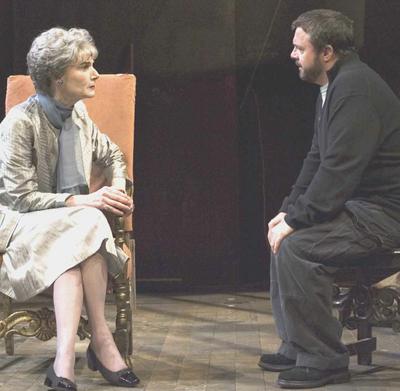 Ms. Seldes and Nathan Lane in pivotal moment of Terrence McNally's
Ms. Seldes and Nathan Lane in pivotal moment of Terrence McNally's
new play Dedication or The Stuff of Dreams.
[Photo : JAMES LEYNSE]
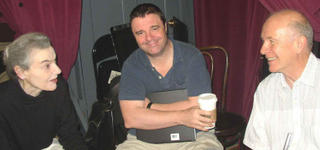
Ms. Seldes, who will turn 77 next week and who's celebrating over 60 years in New York theater, explains that she likes to think that she doesn't usually play anything "as usual" - in a stereotyped way.
"Sometimes, say if you're in a recurring TV role, you constantly replay the part," she says, "but if you do plays you don't play the same part over and over. That's the magic of my life in the theater, certainly with the living playwrights I've worked with. They don't repeat themselves."
She asks that we think of her good fortune to have played in the works of Tennessee Williams, Peter Shaffer, Edward Albee, Neil Simon and now McNally. "And that's only five," she quips. "I could go on."
[She could add Enid Bagnold, author of The Chalk Garden, which Ms. Seldes appeared in opposite Gladys Cooper, in 1955].
"It's my first time to work with Terrence," she reports, "and I never dreamed I'd get to do a play of his. With some playwrights, you sense that you might fit into their work but, in spite of loving everything I've seen of his, I never saw myself in his plays. It's the fate of the theater." She adds, "The fate of growing older in the theater and being the right age - although the character of Annabelle is much older than I am - and being ready to do such a part has helped."
She states that her roles have become more and more interesting. "That's why I'm able to matter to audiences - because of what I've been able to act in and the characters I've played. In film, the older you get the more difficult it is to get work. In theater, the longer you last, the better for you. It's wonderful to see a beautiful or handsome actor, but that isn't the standard in the theater. It's the talent that's our standard.
"The days of handsome leading men and gorgeous leading ladies are gone," continues Ms. Seldes. "One of our greatest actors was Jason Robards Jr. And one of our greatest actresses was Kim Stanley. It was their talent that was so great. Both were unbelievably wonderful in that when they played someone handsome or beautiful they became handsome and beautiful. As was the case with Kim Stanley in Bus Stop [she originated the role of Cherie] - beautiful; and Picnic [in the role of the plain sister Millie to Janice Rule's Madge] - plain. They could be anything, anything!"
For Marian Seldes, the rehearsal process is thrilling. "Finding your way and trying different things is wonderful. On Dedication..., we have a marvelous young director [Morris], who's been fascinating to work with. In fact, though I appeared in it last year, working with Michael is like doing it for the first time."
What has made Dedication... such a happy experience for Ms. Seldes, she reports, is playing opposite Lane, "who's so delicious. We know and love him and he's a genuine star, but that's not who comes into rehearsals. An actor comes. He's a member of the company and when we have our break, he's usually studying the script or doing something quiet by himself. We might have coffee, but we don't jog around the block.
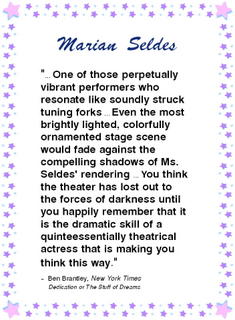
"Because Nathan's funny, successful and all that," she continues, "you have a sort of vision of him. But he's a marvelous actor with an incredible range. That talent really gets to shine in Dedication... [which McNally wrote with him in mind]. I've benefited from his bountiful generosity. You can share with him, take from him, give to him. It makes rehearsing a joy, and this part I'm playing depends on him. Working with him has been a lovely, lovely, unexpected joy in my life!"
No one should be surprised with the number of accolodes heaped on this actress, for Ms. Seldes has worked with giants, "the gold standard," and admits a lot rubbed off on her.
She's performed with John Gielgud ["He was my theater god"; she credits him with molding her as an actress] in Albee's Tiny Alice, where she stood by for Irene Worth, also Crime and Punishment and, at a mere 18 years of age, Medea; Hume Cronyn and Jessica Tandy, Albee's A Delicate Balance; Tallulah Bankhead and Ruth Ford, the short-lived revival of Williams' The Milk Train Doesn't Stop Here Anymore [which co-starred Tab Hunter]; John Wood [and later John Cullum] and Frances Sternhagen, Deathtrap; Anthony Hopkins, Anthony Perkins and Richard Burton, Equus; Henry Fonda and Olivia de Havilland, The Gift of Time [featured but also Ms. de Havilland's standby]; George C. Scott, The Wall; Gladys Cooper and Siobhan McKenna, The Chalk Garden; Katharine Cornell and Henry Daniell, That Lady; Lillian Gish, Crime and Punishment; and Judith Anderson, Medea, which marked Ms. Seldes' Broadway debut. Among contemporary "giants," she's played opposite Kevin Kline in Ivanov and a very young Victor Garber, Deathtrap.
"I also loved the Lunts," notes Ms. Seldes, "but I never had the pleasure of working with them onstage. However, Alfred directed Ondine [1954], where I was featured opposite Mel Ferrer and Audrey Hepburn."
And then there is her devoted friend and frequent companion Brian Murray, whom she co-starred with in The Butterfly Collection and The Play About the Baby. "He's a miracle to work with. He's just, just marvelous in every way. And he's a wonderful director. You would think that being so good, he wouldn't be receptive [to the suggestions of other directors], but he is. He's one of the truest actors I know."
Then, of course, there's Albee. She spends moments trying to evoke words to explain what it's like being in his company. Finally, and in her famous whisper, she states, "He's a mixture of sensible and sensitive. He's quiet, fair and honest. When you're with Edward, you feel safe. You choose your words carefully. He brings that out in whomever he's with. When you truly admire someone, you don't want to waste their time. You want your time with that person to be meaningful. Just meeting someone you admire, even if there's only a brief connection, it's so thrilling."
...............................................................................................................Ms. Seldes with Edward Albee:
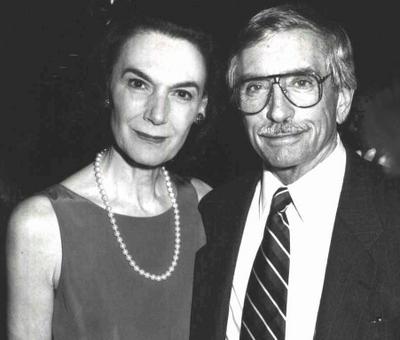
Albee's writing, she goes on to say, "is so brilliant. It's like music. As a singer would sing the notes, if it were music; the actress plays the words. And they're perfect. Edward is so concise and funny. His most serious plays are screamingly funny. You see Virginia Wolf, which could be a tragedy, and there are moments where you're falling about laughing. And so are the characters! The experiences with Edward are so important in my life."
At a recent Drama Desk panel, a guest pointed out to Albee that sometimes Ms. Seldes isn't always faithful to every word in the script. He replied, "That's okay. She gets enough of the words right."
Among the list of first-rate actresses who've inhibited his leading ladies, she appears to be his favorite. "None has the extradordinary variety that Marian can bring. She always astonishes me."
While doing the playwright's Three Tall Women and The Play About the Baby, people often asked "What does the play mean?" Ms. Seldes replied, "It means whatever you took from it when you watched it. No, Edward doesn't spell .everything out. Yes, his plays have mysterious qualities. But that's the way it's supposed to be. It isn't all cut and dry. It isn't something you've seen before. And, best of all, it's not something you're going to see again.
"When we were young, the stories we were told made sense," she continues. "They ended happily. As Oscar Wilde says, ëThe good end happily and the bad end unhappily. That is the meaning of fiction.' But, growing older, you get to a twilight zone where the good don't always end happily and the wicked maybe do. It's all in the writer's creative slant, and that can be unsettling. Edward's plays can unsettle people."
[That might also be said of Albee's play about sculptress Louise Nevelson, Occupant, a staged reading of which Ms. Seldes recently did.]
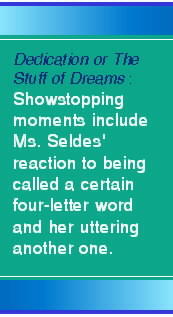
Because the theater costs a certain amount and the majority of theatergoers don't casually go anymore, "it has become an adventure and it's planned out weeks ahead - where to park, where to eat, getting the babysitter and so on. So it surprises me when people take tirades out against what they come to see. I wonder to myself, ëYou must have researched it a little. You've made all these plans. What were you expecting?'"
Actors do become intimately involved with their work. "When most actors read a play the first time, it unfolds for them. They see the character instantly. You can't not. And they hear the voice. And they feel in their body what their character is."
She notes that, unlike in England, actors in America rarely have the commodity of time to prepare before going onstage. "It's so vital," explains Ms. Seldes, "and we never have enough time to go as deeply as we wish. There's always more, especially if it's a wonderfully-written character. That's the blessing of being in a long run - and I've been lucky to be in some. You can keep discovering and improving."
Her loyalty is always to the playwright. "Most actors talk about the terror of opening night and the critics, but if I feel I've come near what the author wants, I'm very satified. I welcome the critics. Let them come! I'm doing what I know the playwright wants and what I love to do and I won't be destroyed if it's not highly praised."
She wonders if the public realizes that the director is never chosen without the 100% approval of the author. "Therefore, although according to the protocol of the theater you follow what the director asks of you, you know he or she's in tune with the author. And in the case of Edward and the two of the plays of his I've done, he'd already directed them. So I absolutely knew what he wanted."
Ms. Seldes spoke of Tennessee Williams. "If he was a shy man -and, indeed, he was, he was so convivial. He was famous for his laugh and not taking himself seriously. Tennessee was easy to be around, lovely to be around. You never felt his ego. What I found surprising was how depreciating he was of his gifts."
Now that many consider her the First Lady of the American Theater - - She quickly interrupts, "Easy, now. Easy! Down, boy!" She cracks up laughing. "Let's not even go there."
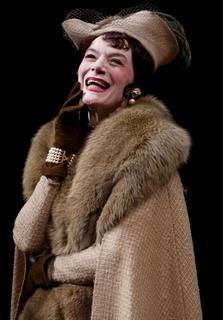
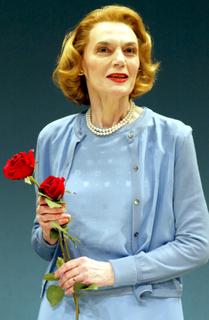
Ms. Seldes in Beckett/Albee As Carlotta Vance in LCT's Dinner At Eight,
for which she received a Tony nomination.
GOING TO THE DOGS: in 2004 in The Royal Family,
Center Theatre Group, Los Angeles and in Dinner At Eight.
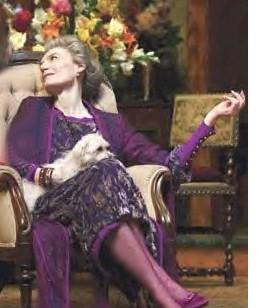
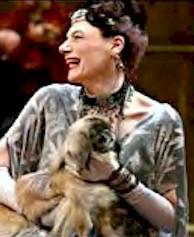
[Photos : CAROL ROSEGG; JOAN MARCUS; CHARLES SCHWARTZ; JOAN MARCUS]
But it hasn't always been fun. In David Kaufman's 2004 Vanity Fair interview, Ms. Seldes spoke of how long it took her to establish a leading lady career; and of 1974, "the most terrible time in my whole career. " She was in her 40s when cast in Shaeffer's Equus. "I wasn't prepared for the public humiliation [British director] John Dexter subjected me to," when during a rehearsal, he yelled "Watch those Jewish hands, Seldes!" Over the following days, she "went onstage with my eyes stinging...I felt I must have been wrong all these years about the theater. I had thought it was a place of joy."
Ms. Seldes, the daughter of Alice Hall and Gilbert Seldes, a respected critic, editor, best-selling author and novelist, playwright, screenwriter, director of television news and educator [founding dean, Annenberg School of Communications, University of Pennsylvania], says her parents couldn't be more different. Her mother was from a long line of "Episcopalian blue-bloods" and her father was Jewish.
She feels her childhood on East 57th Street was particularly blessed not only because her father knew a virtual Who's Who of that era [including Irving Berlin, Charlie Chaplin, e. e. cummings, F. Scott Fitzgerald, James Joyce, Sinclair Lewis, Picasso and Gertrude Stein] but also because she got to tag along a great deal of the time with her father to the theater. She recalls that her first show was Billy Rose's Jumbo, which as it turned out was the first show Edward Albee's adoptive parents took him to. They were born the same year.
At age 14, she was "totally bitten by the bug" on seeing Chekhov's The Three Sisters, starring [and produced by] Katharine Cornell [directed by Guthrie McClintic, her husband] and featuring Ruth Gordon, then in her 40s.
"I'd never experienced anything like that," recalls Ms. Seldes, "and after graduation from the Dalton School I decided against college in favor of going into theater. That didn't go over well with my parents, but I was going to be an actress!"
Her first marriage in 1953 was to successful writer/TV producer Julian Claman, the father of her only child, Katharine [named after Ms. Cornell; she's a writer]. Claman, who was 10 years older, has been described by Ms. Seldes' brother Timothy as charming but also "complex, neurotic and sometimes abusive." Her daughter has said that her father was "difficult and violent." He died at age 50. They were divorced at the time.
It was 29 years before she remarried [1990], to Garson Kanin, the screenwriter of numerous classics of Hollywood's Golden Age, playwright, director and widower of Ruth Gordon, who was over 15 years older than her husband.
She notes that she and Mr. Kanin, whom she'd known for years and even worked with, became inseparable. Many times he asked her to marry him, "but I felt shy about saying yes. Garson's [42-year] marriage to Ruth was so important, as was their collaboration. They were so close and he was absolutely devastated when Ruth died [1985]. But I finally said, ëOkay, let's do it' and Garson was the most wonderful companion you could ever dream of. And, of course, witty and stunningly brilliant. We had great fun. But he was also complicated and serious. Getting to know that part of him was wonderful, too."
Is she complicated? Instead of answering, Ms. Seldes turns the question back: "What do you see?" The writer's reply was: "someone very intelligent, educated and urbane and someone who's very sure of herself. And someone who has a devilish sense of humor." But she doesn't comment.
It's often said that Ms. Seldes is "always on" and she doesn't totally disagree. "I don't just come into a room. I want to bring something, to give pleasure. You don't go through life merely walking in and out of doors. You have an objective."
Her regal way of sweeping into a room as if she had been a veteran ballet or ballroom dancer, her posture, those courtly curtsies and that kiss on the warmly embraced hand, lead some to believe she's not sincere.
Brian Murray's comments to an interviewer speak volumes: "Marian always makes you feel like you are the most important person in the room, yet, when you get to know her, there's absolutely nothing grand about her."
Though legends of fans may have only a momentary "sweep by" with Ms. Seldes, she makes such a warm and gracious impression that they speak of it as if they've had an intimate candlelit evening with her.
"People love Marian ó and for good reason," notes McNally. "There are no bad stories about her." As far as her craft is concerned, he says, "She's more than a survivor ó she's a leader of the movement to make sure theater never goes away."
When Ms. Seldes is informed that some people are intimidated by her, she seems stunned. "Intimidated? By me? I hope not. I have noticed how very polite people are with me. They approach hesitantly and say, ëMiss Seldes, I don't mean to bother you.' It isn't a bother.
"One's weaknesses are not so fascinating," she adds, "so I try to give an impression of confidence and well-being. To my way of thinking, that puts the other person at ease. But I'm just as nervous and anxious as the next person. When someone meets me, I'm thrilled. It means they're interested in my work. It means I've communicated something to them. Live. Alive! Not on a piece of film. You've been with that person. I always say, ëDarling, it's the part.' They don't want to hear that. They want to think it's me. It's not."
MARIAN SELDES: A CAREER RETROSPECTIVE
On Broadway, Ondine [1954]; TV's Perry Mason [1958]; in Deathtrap with John Wood and
Victor Garber; Three Tall Women [1994] with Myra Carter, left, and Jordan Baker; as Vera
Charles with Charles Busch as Auntie Mame in benefit reading [1998]; with Tobey Stevens
[son of Maggie Smith], Ring Round the Moon [1999]; with Brian Murray, The Play
About the Baby [2001]; at Theatre Hall of Fame with executive producer Terry Hodge Taylor.
[Photos : 4) CAROL ROSEGG; 5) KENNETH BLAUVERT; 6) JOAN MARCUS;
7) CAROL ROSEGG; 8) ELLIS NASSOUR]
HIGHLIGHTS
Studied acting under renowned acting instructor Sanford Meisner, New York's Neighborhood Playhouse;
1949, Featured in TV production, Macbeth;
1954, Film debut, The Lonely Night, a TV docudrama produced by the U. S. Public Health Service on mental health;
1963, Obie Award, The Ginger Man;
1967 to 1991, faculty member, Juilliard School of Drama, where her students included Christine Baranski, Kelsey Grammer, Kevin Kline, Laura Linney, Patti LuPone, Kevin Spacey, Robin Williams;
1967 Tony Award, Best Featured Actress, Edward Albee's A Delicate Balance;
1970s, Recurring guest on CBS Radio's Mystery Theater;
1971, Tony Award and Drama Desk Award nominations, Actress (Play), Father's Day;
1977, Obie Award, Isadora Duncan Sleeps with the Russian Navy;
1978, Co-starred in Deathtrap, never missing a performance over five years - an achievement that won her entry into the Guinness Book of World Records;
1978, Tony Award nomination, Best Featured Actress, Play, Deathtrap;
1978, Published autobiography, The Bright Lights;
1983, Outer Critics Circle Award, Painting Churches;
1994, Co-starred in Albee's Three Tall Women, Outer Critics Circle Award;
1996, Inducted into the Theater Hall of Fame;
1998, Drama Desk nomination, Outstanding Featured Actress, Ivanov;
1999, Tony Award nomination, Best Actress, Play, for the revival of Ring Round the Moon;
2001, Drama Desk nomination, Outstanding Actress (Play), Albee's The Play About the Baby;
2000, The Madge Evans & Sidney Kingsley Award for Excellence in Theater;
2001, Obie Award for Sustained Achievement.
2001 and 2005, Fordham University faculty;
2003, Nominated for her fifth Tony Award, Best Featured Actress, Play, for LCT's Dinner at Eight [a last-minute replacement for ailing Dorothy Loudon in the role of Carlotta Vance];
2003, Edwin Booth Award;
2004, The first annual Seldes-Kanin Fellowship Awards;
2005-2007, Honorary Chair, Theater Hall of Fame;
2006, Co-chair, 35th Anniversary, Theater Hall of Fame benefit.
Film highlights: Mona Lisa Smile, The Haunting, Celebrity, Town and Country, Home Alone 3, Affliction, Tom and Huck, The Gun in Betty Lou's Handbag, Digging to China, The Greatest Story Ever Told [a memorable Herodias], The Big Fisherman, The Light in the Forest, Crime and Punishment U.S.A. and
The True Story of Jesse James.TV roles include: Club House, If These Walls Could Talk 2, Truman, Gertrude Stein and a Companion. Guest appearances: Remember WENN, Cosby, Wings, Murphy Brown, Murder She Wrote, Law & Order, Othello [Emilia to Walter Matthau's Iago], General Electric Theater, Hallmark Hall of Fame, Alfred Hitchcock Presents, Perry Mason and Gunsmoke.
--------
Saturday, August 27, 2005 at 12:01 AM | Item Link

Ellis Nassour is an international media journalist, and author of Honky Tonk Angel: The Intimate Story of Patsy Cline, which he has adapted into a musical for the stage. Visit www.patsyclinehta.com.
He can be reached at [email protected]
The last five columns written by Ellis Nassour:
07/02/2010: Summer in the City: Fireworks on the Hudson Launch a Season with Plenty to Do and See
06/13/2010: The 64th Annual Tony Awards Celebrating Broadway Achievement
06/10/2010: Tony Honoree Marian Seldes: Grand Duse of the American Theater
For a listing of all features written by Ellis, click here.
[Advertisement]
[Advertisement]

If you would like to contact us, you can email us at feedback@
broadwaystars.com
[Advertisement]
[Advertisement]

- July 15: Harry Connick, Jr. in Concert on Broadway - Neil Simon
- Sept. 28: Brief Encounter - Studio 54
- Sept. 30: The Pitmen Painters - Samuel J. Friedman Theatre
- Oct. 3: Mrs. Warren's Profession - American Airlines Theatre
- Oct. 7: Time Stands Still - Cort Theatre
- Oct. 12: A Life In The Theatre - Schoenfeld Theatre
- Oct. 13: Bloody Bloody Andrew Jackson - Bernard Jacobs Theatre
- Oct. 14: La Bete - The Music Box Theatre
- Oct. 21: Lombardi - Circle In The Square
- Oct. 25: Driving Miss Daisy - John Golden Theatre
- Oct. 26: Rain - A Tribute To The Beatles On Broadway - Neil Simon Theatre
- Oct. 31: The Scottsboro Boys - Lyceum Theatre
- Nov. 4: Women On The Verge Of A Nervous Breakdown - Belasco Theatre
- Nov. 9: Colin Quinn Long Story Short - Helen Hayes Theatre
- Nov. 11: The Pee-Wee Herman Show - Stephen Sondheim Theatre
- Nov. 13: The Merchant of Venice - The Broadhurst Theatre
- Nov. 14: Elf - Al Hirschfeld Theatre
- Nov. 18: A Free Man Of Color - Vivian Beaumont Theater
- Nov. 21: Elling - Ethel Barrymore Theatre
- Dec. 9: Donny & Marie: A Broadway Christmas - Marquis Theater
- Jan. 13: The Importance of Being Earnest - American Airlines Theatre
- Mar. 3: Good People - Samuel J. Friedman Theatre
- Mar. 6: That Championship Season - Bernard B. Jacobs Theatre
- Mar. 11: Kathy Griffin Wants a Tony - Belasco
- Mar. 17: Arcadia - Barrymore Theatre
- Mar. 20: Priscilla Queen Of The Desert The Musical - The Palace Theatre
- Mar. 22: Ghetto Klown - Lyceum Theatre
- Mar. 24: The Book Of Mormon - Eugene O'Neill Theatre
- Mar. 27: How To Succeed In Business Without Really Trying - Al Hirschfeld Theatre
- Mar. 31: Bengal Tiger at the Baghdad Zoo - Richard Rodgers Theatre
- Apr. 7: Anything Goes - Stephen Sondheim Theatre
- Apr. 10: Catch Me If You Can - The Neil Simon Theatre
- Apr. 11: The Motherf**ker with the Hat - Gerald Schoenfeld Theatre
- Apr. 14: War Horse - Vivian Beaumont Theater
- Apr. 17: Wonderland: A New Alice. A New Musical Adventure. - Marquis Theatre
- Apr. 19: High - Booth Theatre
- Apr. 20: Sister Act - The Broadway Theatre
- Apr. 21: Jerusalem - Music Box
- Apr. 24: Born Yesterday - Cort Theatre
- Apr. 25: The House of Blue Leaves - Walter Kerr Theatre
- Apr. 26: Fat Pig - Belasco Theatre
- Apr. 27: Baby It's You! - Broadhurst Theatre
- Apr. 27: The Normal Heart - Golden Theater
- Apr. 28: The People in the Picture - Studio 54
- Apr. 28: The End of The Season
- Jun. 12: The 65th Annual Tony Awards - Beacon Theatre
- June 14: Spider-Man, Turn Off The Dark - Foxwoods Theater
- June 21: Master Class - Samuel J. Friedman
